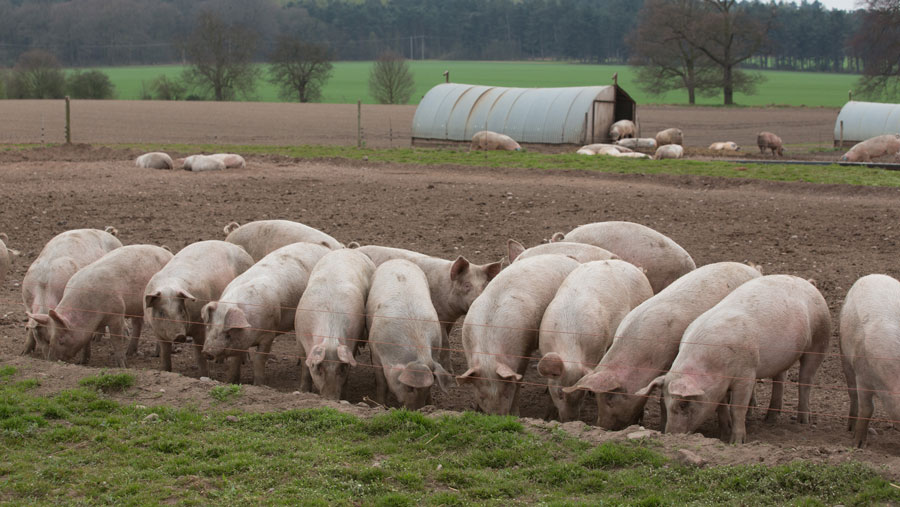Labour shortage may force cull of healthy pigs, warns NPA
 © Tim Scrivener
© Tim Scrivener Pig producers are warning that thousands of healthy pigs will have to be destroyed unless the government steps in to solve the worker shortage crisis at meat-processing plants.
The National Pig Association (NPA) says a surplus of 70,000 pigs has backed up on UK farms – and the number is growing by 15,000 every week.
The problem has been caused by a shortage of workers at abattoirs and meat-processing plants. Eastern European workers who would normally carry out the work returned home during the pandemic and many have not returned to the UK.
See also: Producers cut back sow numbers amid pig industry crisis
“If the pigs can’t go to slaughter and we run out of space, they will have to be destroyed,” said NPA chief executive Zoe Davies. “To me, that would be the worst possible scenario.”
All the major pig processors have cut throughput by up to 25% in the past few weeks because of labour shortages, largely at the butchery end.
Housing difficulties
This has left pigs that require feeding backing up on farms, and is also causing housing difficulties. Some pigs are growing by as much as 1kg a day, the NPA said.
Dr Davies said the NPA, NFU and a number of other bodies and trade organisations across the food sector were pressuring the government to act now to provide solutions to the labour crisis.
“To date, the government has effectively been saying: ‘British people voted for Brexit and controlled immigration. Therefore, you must focus on employing people from the UK,’” said Dr Davies.
“They have also been talking about the furlough scheme ending in November and that there will be all this available labour.
“However, most of the people coming off furlough won’t be living in areas where the food manufacturing plants are, and they don’t have the right skills.”
The NPA says the government must intervene now.
“We can’t wait until the end of September,” said Dr Davies. “This is a critical situation that needs to be sorted right now. Otherwise, we’re going to get to a really difficult decision-making situation back on farm.”
Britain’s meat processing industry is staffed by two-thirds non-UK workers. It has a current shortfall of around 15% of its workforce of about 95,000 people, according to the British Meat Processors Association (BMPA).
The Association of Independent Meat Suppliers (AIMS) is calling on the Home Office and UK Visas & Immigration to make meat processors eligible for skilled worker status.
Skilled worker ‘omission’
AIMS spokesman Tony Goodger said the jobs of butcher, slaughterman and butchery managerial roles meet the RQF3 skills threshold, so are eligible to be sponsored for a skilled worker visa. But the government says meat processors do not meet the criteria.
Mr Goodger said he was confused by the government adding poultry processors to the skilled worker visa list, but omitting meat processor roles.
“This omission is already affecting our members at a time when the industry is facing severe labour shortages,” he added.
The meat processing industry is just one of a number of sectors that have been hit by crippling labour shortages since Brexit and movement restrictions caused by the Covid pandemic.
Lorry driver shortage
A shortage of lorry drivers in the food and farming industry has put pressure on milk and livestock collections and feed deliveries to farms, and has led to stock shortages in supermarkets.
James Peck, of PX Farms, based in Cambridgeshire, said he was about eight workers down this harvest, out of a farming workforce of 24 and total staff of 48.
“The people who come over are normally the same ones who have been coming for 10 years-plus. They are quite skilled within our business and are pretty important, so not having them here has been extremely difficult,” he said.
Mr Peck, who also runs agri haulage company PX Farms Haulage, said he had three lorries without drivers.
He said schemes from companies such as Tesco, offering £1,000 joining bonuses to lorry drivers along with higher wages, had caused huge unsettlement.
